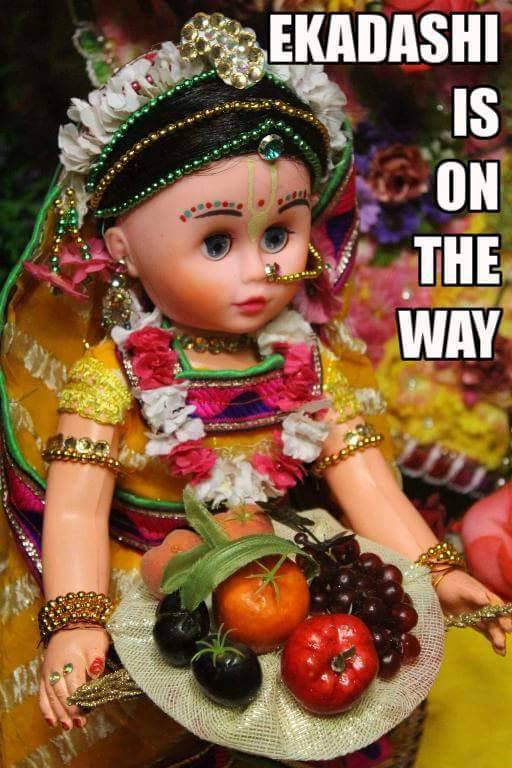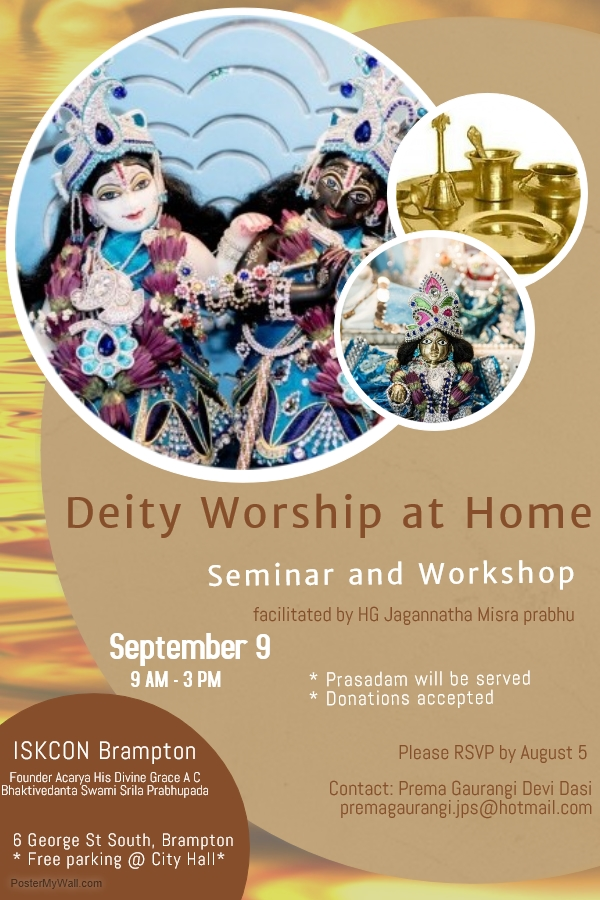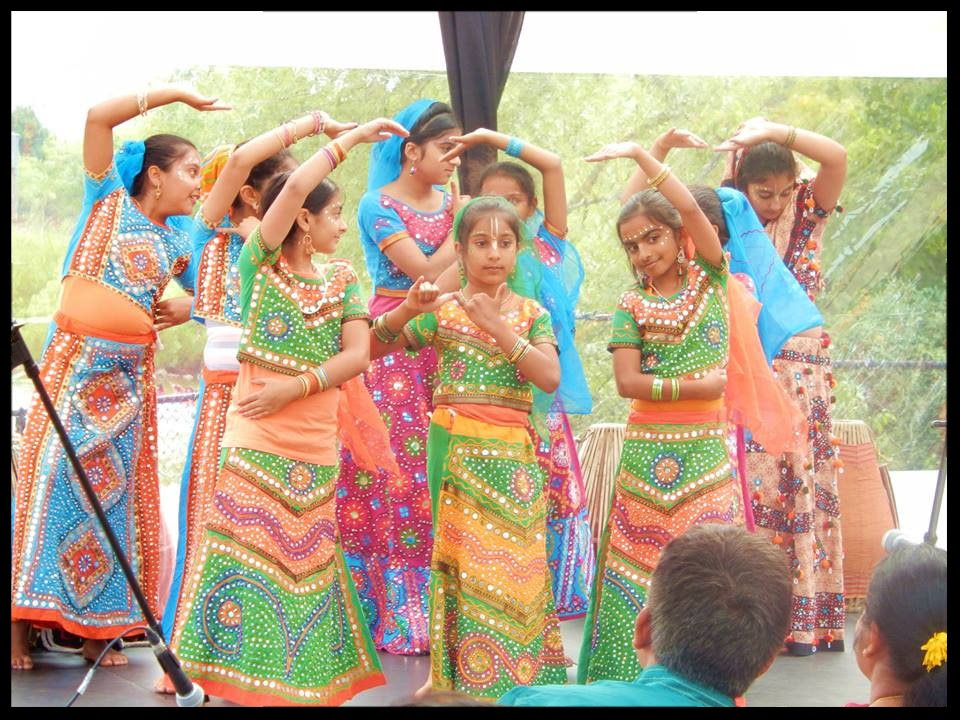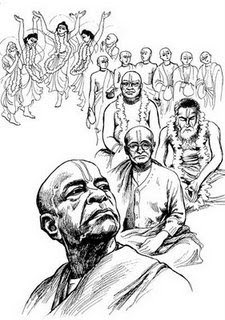
H.G. Gopal Prabhu’s class about the Acceptance of Sannyasa by Srila Prabhupada, ISKCON Vrindavan (video)
Read More...
Websites from the ISKCON Universe

H.G. Gopal Prabhu’s class about the Acceptance of Sannyasa by Srila Prabhupada, ISKCON Vrindavan (video)
After removing the scaffolding from the West Wing Planetarium Dome these photos reveal the amazing golden beauty of the titanium nitrate Kalash and the solid stainless steel, gold-plated Chakra recently installed. One can only imagine what will be the effect of seeing the huge Kalash and Chakra when mounted upon the Main Dome of the […]
The post ToVP Chakra /Kalash photos appeared first on Mayapur.com.
The deities at Seattle temple are magnificent and I feel very fortunate to have Their Darshan. It took a great effort to install Them and build a beautiful temple but now the whole city is benefitted.
On Janmastami there were 14,000 visitors who came to participate in the many activities that day. Sri Sri Radha, Nila Madhava, Sita, Rama, Laksman, Hanuman, Jagannatha Baladeva Subhadra and Sri Sri Gaura Nitai are certainly merciful.
 Indira Ekadasi
Indira Ekadasi Adult Education At The Temple
Adult Education At The Temple Japathon-Congregational Mantra Meditation
Japathon-Congregational Mantra Meditation Sunday School
Sunday School Monthly sankirtan Festival(MSF)
Monthly sankirtan Festival(MSF) The Mentorship Program
The Mentorship Program Gift Shop
Gift ShopThe post Daily Darshan : September 08, 2017 appeared first on Mayapur.com.
 Auckland NZ: Holy name week 2017 (Album with photos)
Friday night Harinam sankirtana Ki Jaya!
Find them here: https://goo.gl/t75cHE
Auckland NZ: Holy name week 2017 (Album with photos)
Friday night Harinam sankirtana Ki Jaya!
Find them here: https://goo.gl/t75cHE 
ISKCON Europe Excellence Awards (IEEA) for 2017.
We are now calling for nominations for the ISKCON Europe Excellence Awards (IEEA) for 2017. The IEEA recognizes the sincere service of devotees who have dedicated their lives to the mission of Srila Prabhupada within Europe. These awards are to encourage such exemplary devotees and also to inspire all other devotees by their example.

Jayadev John Richardson on Kirtan (15 min video)
Balaram Nityananda Das: Jayadev John Richardson is an international musician/ artist, having sold 30 million records worldwide. He has also facilitated 150 mantra choirs in 25 countries. Most importantly, he has been practicing Bhakti-Yoga for nearly 35 years and has been a drummer for the past 55 years, with a wealth of experience and knowledge in the musical and healing arts. Please hear what he has to say!
Watch it here: https://goo.gl/Unr5fz

What a coincidence!
On a Monday afternoon, in the recent mid-year marathon, Bal Gopal, my husband, and I were trying a little book distribution along the busy Lambton Quay in Wellington. Nobody was showing much interest at all. We were on our way home from serving Krsna Food and had to stop at the bank to deposit the takings from that day.
Inside the bank, I held up the Science of Self Realisation, showing it to Bal Gopal, and recited the Panca Tattva mantra, pleading aloud: “Please, Gauranga, let us meet one sincere person who will be interested in buying this book.”
We stepped outside, and the very first person walking by, whom I held a book up in front of — Hiding in Unnatural Happiness — simply asked “Happiness?”
She looked at the cover, stopped, and said, “Oh, my gosh! This is far out! I’m reading this book right now!”
We asked, “Where did you get it? Wow!”
She said, “I found it in my friend’s house and just started reading it.
I asked how it was going, and she replied, “I absolutely love it! I’m up to the part describing three kinds of happiness.”
We commented on the coincidence of our meeting. The author, Devamrita Swami, had been in Wellington on the weekend.
I handed her The Science of Self Realisation, saying, “You might like this one.” I said that the author is the teacher of her book’s author.
She said that she always looks for new books, something to read on the train that she catches to work. She was interested, but had no cash, so we walked together to an ATM, and she gave a donation.
Feeling inspired, we also showed her Devamrita Swami’s Searching for Vedic India, which she also took.
Hiding in Unnatural Happiness is certainly appreciated, and it inspires people to read Srila Prabhupada’s books!
My gratitude to the merciful Panca Tattva!
Your servant,
Ananda Candra Devi Dasi
 Harinama, book and prasadam distribution @Bali Beach.
7.9.2017 (Album with photos)
Srila Prabhupada: One should invite people, chant Hare Krishna...
Harinama, book and prasadam distribution @Bali Beach.
7.9.2017 (Album with photos)
Srila Prabhupada: One should invite people, chant Hare Krishna... 
Celebrating Adivas of World Holy Name Week in Portugal
Sept. 7, 2017, Lisbon, Portugal.
World Holy Name Week starts on Sept. 9th and culminates on Sept. 17.
“Srila Prabhupada arrived in Boston, USA, and I began my celebration of World Holy Name Week early by a series of Harinam events in Boston. Even after the long flight today from Boston, USA, I felt fresh and inspired in the sea breeze of the port city of Lisbon, Portugal. The locals and tourists were blissfully smiling, waving, dancing, taking selfies with us and chanting along with us in the kirtan”, Ekalavya Das, World Holy Name Week team member said.
A series of Harinam Sankirtan events are planned next week in Milano, Italy.
In an interview with an other member of the World Holy Name Week’s organising committee, kirtaniya Vishwambar Das mentioned how the Hare Krishna mahamantra has become a household name, thanks to Srila Prabhupada.
“By the grace of Srila Prabhupada, the entire world has become familiar with the chanting of the Hare Krishna mantra and so many people in their lives, with their families and friends gather together to chant the holy names,” he said.
With the event being just one day away, Vishwambar Das encourages people to participate in the event and understand the value of the precious gift of the mahamantra that Srila Prabhupada has given.
“This is a very special time dedicated to chanting the holy names - a whole week of gathering together to go deeper and deeper in manifesting the potency of the holy name in our hearts,” he says. “If we can take this seriously, we can create a change in our hearts and thus create a change in anyone we meet, and in the world. This is the great gift that Srila Prabhupada has given us - the ambassador of the holy names.”
The event which will be held between the 9th and the 17th of September 2017 celebrates the centurial anniversary of Srila Prabhupada arriving into the West to propagate the glories of the holy name and the message of Sri Caitanya Mahaprabhu. Temples and centres across the globe are invited to participate in this event making it one of a kind. They can hold various events like japa marathons, seminars, harinams, kirtan melas and much more on an individual and a congregational level.
Interested devotees may contact the World Holy Name Week organisers on connect@worldholyname.org or log into www.worldholyname.org for more details.
“So, let us all do our part to support the World Holy Name Week and uplift our consciousness and uplift the consciousness of the whole world through Krishna consciousness,” concluded Vishwambar Das.
By Bhaktin Diksha
Member - World Holy Name Week Team
World Holy Name Week
Sept. 9 - 17, 2017
Srila Prabhupada’s Gift to the World!
www.worldholyname.org

Haridas Thakur Disappearance Day (video)
H.G. Rohini Suta Prabhu’s class from CC Antya 11.25 at ISKCON Vrindavan
Read More...
Answer Podcast
The post When waves of desire come suddenly, do they have some rational cause? appeared first on The Spiritual Scientist.
Answer Podcast
The post When, because of our bhakti principles, we can’t eat the food offered by our relatives, how can we avoid alienating them from bhakti? appeared first on The Spiritual Scientist.
[Reflection at Gainesville, USA]
Podcast
The post Temptation is caused not so much by perception as by provocation appeared first on The Spiritual Scientist.
[Talk at Krishna House, Gainesville, USA]
Podcast
Podcast Summary
The post Six loving exchanges – Opening the heart and reciprocating with the opened heart appeared first on The Spiritual Scientist.
[Talk at Krishna House, Gainesville, USA]
Podcast
Podcast Summary
The post We are defined by the questions we ask – in life, in science and in spirituality appeared first on The Spiritual Scientist.
Audio Podcast :
Video :
The post Prabhupada life-story 04 – League of Devotees – A clique thwarts the promise appeared first on The Spiritual Scientist.

Beautiful theatrical performance in Bhakti Sangam Festival (Album with photos)
Srila Prabhupada: The Hare Krishna mantra says, “My dear Lord Krishna, my dear Lord Rama, O energy of the Lord, Hare, kindly engage me in your service.” (Srimad-Bhagavatam, 4.24.69 Purport)
Find them here: https://goo.gl/t27AQT
 Vaishnava blissfulness in the Bhakti-Sangam festival (Album with photos)
Srila Prabhupada: The mantra delivers the conditioned soul from his bond...
Vaishnava blissfulness in the Bhakti-Sangam festival (Album with photos)
Srila Prabhupada: The mantra delivers the conditioned soul from his bond...  If you love Krishna in any capacity, you shall never be frustrated because everything in Krishna is perfect, eternal, blissful and full of Knowle...
If you love Krishna in any capacity, you shall never be frustrated because everything in Krishna is perfect, eternal, blissful and full of Knowle... 
The Cause of Crime.
Krishna Dharma Dasa: There are 80,000 people incarcerated in Britain’s prisons, twice as many as there were ten years ago - and the number is still rising. Strangely, though, crime figures are supposedly falling. That’s a debatable point, because many will argue that people are increasingly disinclined to report petty crimes, seeing that hard-pressed police are unlikely to respond, and even if they do it will serve little purpose. The chance of getting back stolen goods or having an offender apprehended in minor cases is remote.
Nevertheless, those offenders who do find themselves before a judge are more likely than ever to receive a custodial sentence. This at least is the view of the Prisons Reform Trust, which says that although the number of guilty findings in courts has stayed more or less the same, there has been a “creeping inflation of sentences and a lack of confidence in effective community measures.”
The trust puts it down to a number of factors, such as public demand for stiff sentences in the wake of high-profile, reviled crimes like child murders. However, it derives particularly from the prevailing political view that “prison works,” a phrase coined by Michael Howard when he was Home Secretary about fifteen years ago. Soon after that New Labour came into power with its manifesto to be “tough on crime, tough on the causes of crime,” a policy pursued till today.
But does prison work? Is it tough on crime and its causes? Figures show that 60% of prisoners re-offend within two years of release. Prison, of course, is an excellent place to meet criminals and learn new tricks. The Vedas point out how our consciousness is quickly shaped by our association, which in prisons is hardly of the best kind. With this in mind, another Home Secretary, David Waddington, said in a government paper, “Prison is an expensive way of making bad people worse.”
In fairness it has to be said that attempts are made to rehabilitate criminals, but seemingly to an insufficient degree.
So is more training the solution? According to the Vedas the answer is yes, but it has to be of a certain kind, and preferably before we find ourselves detained at Her Majesty’s pleasure. Srila Prabhupada writes, “Simply enforcing laws and ordinances cannot make the citizens obedient and lawful. That is impossible. Throughout the entire world there are so many states, legislative assemblies, and parliaments, but still the citizens are rogues and thieves. Good citizenship, therefore, cannot be enforced; the citizens must be trained.”
He goes on to say that the training must be in varnashrama, the Vedic system of organizing society into occupational and spiritual orders. This should have the aim of reviving our eternal Krishna consciousness, which is the purpose of varnashrama.
In such a properly educated and organized society crime would be reduced for different reasons. Initially, it would reduce the number of untrained, unemployed and possibly needy people who feel forced to resort to crime. But the main benefit, and one that tends to be absent from current government programs, is spiritual. Vedic training in spirituality or God consciousness makes one peaceful. It reduces the root cause of all moral transgressions: material desire. Because we think that having more means being happier, we will generally stop at little to get more, including breaking a law or two if we can go undetected.
Implementing varnashrama and engaging everyone according to their propensities, which it entails, is a major challenge, but its essential aim of awakening our Krishna consciousness is something we can do immediately. In a conversation with the Mayor of Evanston, a district of Chicago which was experiencing a crime wave, Srila Prabhupada asked that ISKCON be given facility for public chanting and dancing in glorification of the Lord and the distribution of sanctified food. He explained that this was the way to cure people of the “material infection” that leads to crime. Prabhupada said, “So if we cure that infection, again he becomes good. So this is the curing process. It is not an external, artificial thing, imposed upon somebody. No, his goodness is there.”
In other words, we are all intrinsically good, being parts of the supreme good or God. We just need to revive our original spiritual nature and that goodness will emerge. Being cured of the material infection also means finding within our selves the happiness we futilely seek elsewhere. Beguiled by an endless array of advertisements prompting us to purchase products we don’t need and can hardly afford, we are gripped with desire and then frustration and dismay when we either fail to procure them, or they fail to satisfy us even if procured. Hence we see spiraling statistics of depression, as well as a concomitant surge in the use of alcohol and drugs, major contributors to crime.
The only way to reverse this trend is to connect ourselves with Krishna, the source of spiritual bliss. Then peace and contentment will prevail. Otherwise our programs of social reform, devoid as they are of spiritual content, are always going to struggle.

Paramatma: God as the Source of Inspiration and Insight.
By the late Dr. T.D. Singh.
According to Vedanta [summative Vedic techings], the Supreme Lord expands and accompanies each and every living entity in order to guide his/her activities. This is seen in the form of inspiration or a sudden flash of insight experienced by scientists at the time of discovery, and by poets and artists in different circumstances.
Let us consider the example of a spaceship. We make these spaceships and send them out in space with astronauts with some specific plan and purpose. If we look inside the spaceship, we will find that each and every part will have a purpose in the overall working of the spaceship to achieve the objective for which it was designed. Such is the case with all the wonderful planets moving in this vast universe. According to Vedanta, all the different planets and luminaries moving at different speeds and with a variety of facilities and atmospheric conditions are created under the supervision of the Supreme Lord for a definite purpose. Observation of the wonderful intelligence and specialty in the laws of the universe has led many scientists to conceive the divine hand of God behind creation. Newton, whose laws of motion and gravitation gave birth to the age of science, said, “This most beautiful system of the sun, planets and comets could only proceed from the counsel and dominion of an intelligent and powerful Being.” Similarly, Nicholas Copernicus felt that “the universe has been brought for us by a supremely good and orderly Creator.”
Kepler, who gave three famous laws of planetary motion, felt God’s presence in His wondrous variety of creation. At the end of the fifth book on Cosmic Harmony Kepler writes, “I have endeavored to gain for human reason, aided by geometrical calculation, an insight into His way of creation; may the Creator of the heavens themselves, the father of all reason, to whom our mortal senses owe their existence, may He who is himself immortal … keep me in His grace and guard me from reporting anything about His work which cannot be justified before His magnificence or which may misguide our powers of reason, and may He cause us to aspire to the perfection of His works of creation by the dedication of our lives … .” All these above statements of scientists support the role of the Paramatma feature of the Lord in the life of everyone.
Paramatma is the partial expansion of the Supreme Person. This feature of the Supreme Personality of Godhead is responsible for inspiration, discovery, creativity and movement of all living entities. As stated by the Lord in Bhagavad-gita, “I am seated in everyone’s heart, and from me come remembrance, knowledge and forgetfulness.”
The Theory of Big Vision can answer many of the questions of which one can find no solution in the Big Bang model. Why are there so many different planets and when and how will our universe end? According to Vedantic cosmology, these different planets are created to fulfill different desires of different living beings and our universe is a closed universe, which will end in 155.518 x 10 to the 12 power years. Based on Vedantic cosmology, the Theory of Big Vision further tells us that the present age of the universe is 155.522 x 10 to the 12 power years.
The post Daily Darshan: September 07,2017 appeared first on Mayapur.com.

More Than Ever Before (Album with photos)
Indradyumna Swami: Ukraine ISKCON is one of the most successful yatras in the world. That was evident at the annual Bhakti Sangam Festival over the last few days, where devotees attended numerous seminars, chanted and danced in great ecstasy and relished each other’s association more than ever before.
[ All photos by Mykola Kutsyi from Ukraine ]
Find them here: https://goo.gl/sNbyMK
 By His Divine Grace A.C.B. Swami Prabhupada
By His Divine Grace A.C.B. Swami Prabhupada Discussion of Śrīmad-Bhāgavatam, which describes the character and pastimes of devotees and the Lord, is very quickly effective. The International Society for Krishna Consciousness has been organized for this purpose. In every center of this Society—not only in the morning, evening or noon, but practically twenty-four hours a day—there is continuous devotional service going on. Anyone who comes in contact with the Society automatically becomes a devotee. We have actual experience that many karmīs and others come to the Society and find a very pleasing and peaceful atmosphere in the temples of ISKCON. Continue reading "When and how to read, recite, chant and hear Srimad Bhagavatam
→ Dandavats"
 Maha Big Sankirtan in Odessa, Ukraine (10 min video)
Srila Prabhupada: The true acarya presents Krishna to everyone by preaching the holy name of...
Maha Big Sankirtan in Odessa, Ukraine (10 min video)
Srila Prabhupada: The true acarya presents Krishna to everyone by preaching the holy name of... Its six o’clock on Monday evening at The Loft Yoga Lounge and most of the guests have arrived. Lenny and I volunteer at the loft, helping to run their daily events. We have just completed cooking a vegan meal for 40 guests to enjoy after their yoga or meditation class. It was an intense but […]
The post Perfection of Talents (with Tomato Soup Recipe!) appeared first on The Loft Yoga Lounge Auckland.
[Reflection at Gainesville, USA]
Podcast
The post Irrational irritability results from indiscriminate sensuality appeared first on The Spiritual Scientist.
[Reflection at Gainesville, USA]
Podcast
The post Can machines think? appeared first on The Spiritual Scientist.
[Reflection at Gainesville, USA]
Podcast
The post Go beyond the mind’s transitory feelings to the heart’s transcendental feelings appeared first on The Spiritual Scientist.
 “Merely having an open mind is nothing; the object of opening the mind, as of opening the mouth, is to shut it again on something solid.”
“Merely having an open mind is nothing; the object of opening the mind, as of opening the mouth, is to shut it again on something solid.”
– G K Chesterton
Video:
Podcast:
Download by “right-click and save”
Contemporary ethos exhorts us to be open-minded and excoriates the follies and perils of close-mindedness. Given that many people with narrow-minded, black-and-white view of things are intolerant and even violent, we do need reminders to be open-minded.
And yet overemphasizing the danger of one extreme can push us to the other extreme, whose dangers we overlook because of our paranoia about the other extreme. That’s why we need to remember the dangers not just of narrow-mindedness but also of extreme open-mindedness. We need to guard against being so open-minded that our brains fall out, of becoming utterly uncritical in evaluating things, of sentimentally assuming to be subjective things that have an objective reality, especially when such a wrong assessment can have objective harmful consequences.
For example, when doctors diagnose a patient, they need to be open-minded about what the patient might be suffering from. If they go in with a preconceived notion that the patient is a hypochondriac or that the patient, having come from a drug user’s social stratum, must be suffering from a drug-induced complication, that bias can skew their objectivity.
And yet, doctors can’t diagnose with an entirely empty mind. If they refuse to use the knowledge they have acquired during their medical education and experience, equating such knowledge with close-mindedness, they can’t assess the symptoms and the implication of those symptoms. A doctor who stays inconclusive about the diagnosis can’t help the patient. Worse still are the doctors who consider such inconclusiveness a virtue. Similar are those extreme relativists who claim subjectivity to be the ultimate virtue in the pursuit of knowledge.
To better understand this, let’s analyze the mouth metaphor used in this quote. If we are to be nourished, we need to open our mouth to take in food. And taking in food requires not just opening the mouth at the right time, but also closing it at the right time. Otherwise, if our mouth stays open, the food can’t nourish us just as it couldn’t have nourished us if our mouth were closed.
Similarly, our mind needs to stay open to take in the world, to receive the information coming in through our sensory channels. If we don’t objectively take in the sensory information, that is, if we don’t hear what others are saying as they are saying it, then we will simply read our own biases into their statements. While striving for objectivity, we need to simultaneously strive for comprehension. We need to arrive at some tangible understanding of the situation – our mind needs to wrap itself around the information taken in and process it properly using our God-given intelligence. Just as opening our mind to receive information is critical for comprehension, so too is closing the mind around that information in the sense of processing that information.
Overemphasis on open-mindedness leads ultimately to extreme relativism, wherein everything is considered subjective and nothing objective. But then, even relativism makes the absolute, non-subjective claim that everything is relative. By spotlighting this self-contradictory presumption lying at the foundation of relativism, its fallaciousness can be exposed.
Unfortunately, such relativism is used nowadays to denigrate or even deny the presence of any big picture – a holistic worldview that provides answers to life’s big questions. Challenging the hegemony of relativism is essential to prevent open-mindedness from degenerating into a free fall to empty-mindedness. We can most effectively challenge relativism’s absolutism by opening ourselves to time-honored sources of wisdom that offer objective parameters and processes for determining the nature of reality.
By using our intelligence to navigate the balance between bigotry caused by unthinking close-mindedness and vacuity caused by unthinking open-mindedness, we can arrive at a thoughtful understanding of reality. Then, we will be equipped with the humility to stay open to better understanding while also having the confidence to function effectively with our present understanding.
The post Be open-minded, not empty-minded appeared first on The Spiritual Scientist.

In the wake of Hurricane Harvey’s unprecedented flooding and devastation, Texas Governor Greg Abbott proclaimed Sunday, Sept 3rd as a Day of Prayer in Texas—which happened to coincide with the birth anniversary of Bhaktivinoda Thakur, a 19th century Vaishnava Hindu saint and theologian who envisioned people from all nations coming together harmoniously through the blissful chanting of the holy names of God.